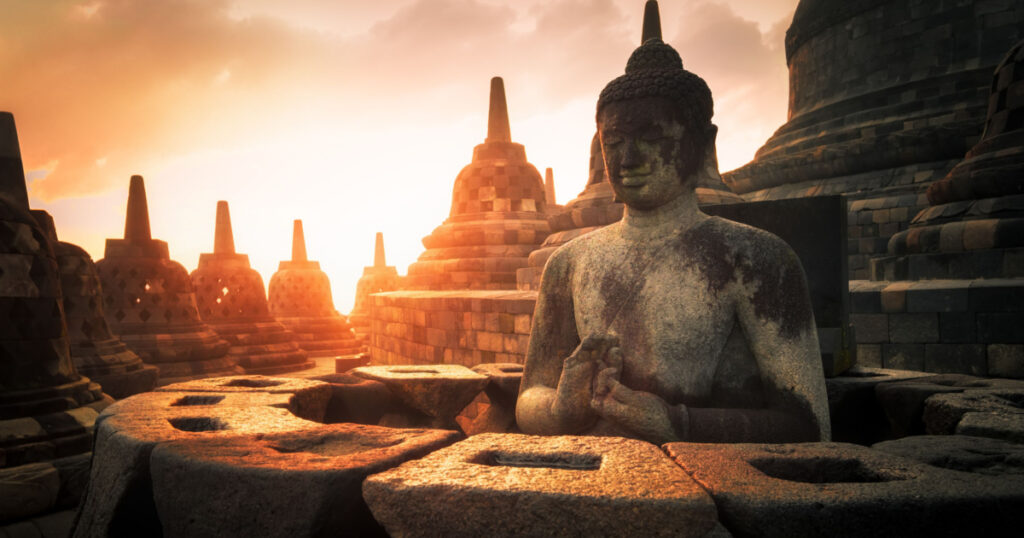Life often demands overcoming hurdles for survival. Although denying these challenges may seem tempting, confronting them is crucial for a fulfilling existence. Buddhist philosophy encourages embracing life’s entirety, even its unfavorable aspects, aligning with reality instead of resisting the natural order of the universe. Here are five truths from Buddhism about life:
1) Worrying is useless.

Thich Nhat Hanh’s wisdom rings true: “Worrying does not accomplish anything.” The essence lies in understanding that excessive worrying about the future doesn’t change its course. His guidance to remain rooted in the present without fixating on elusive future happiness conditions echoes the essence of mindfulness. It urges us to embrace the now, finding contentment within it rather than fretting over uncertainties.
Read: 11 Pieces Of Buddhist Wisdom That Will Transform Your Life
“Worrying does not accomplish anything. Even if you worry twenty times more, it will not change the situation of the world. In fact, your anxiety will only make things worse. Even though things are not as we would like, we can still be content, knowing we are trying our best and will continue to do so. If we don’t know how to breathe, smile, and live every moment of our life deeply, we will never be able to help anyone. I am happy in the present moment. I do not ask for anything else. I do not expect any additional happiness or conditions that will bring about more happiness. The most important practice is aimlessness, not running after things, not grasping.” – Thich Nhat Hanh
2) If we want to be happy, we must see reality for what it is

Pema Chödrön’s insights highlight the significance of challenging fixed beliefs and assumptions. She notes the choice between accepting fixed realities or embarking on a journey of curiosity and openness. This challenges us to embrace the fluidity of truths, encouraging a mindset open to evolving perspectives.
“We have two alternatives: either we question our beliefs – or we don’t. Either we accept our fixed versions of reality- or we begin to challenge them. In Buddha’s opinion, to train in staying open and curious – to train in dissolving our assumptions and beliefs – is the best use of our human lives.” – Pema Chödrön
3) We need to accept change actively

Daisaku Ikeda emphasizes Buddhism’s view of constant change. He encourages proactive engagement with change, aligning our efforts to influence positive transformations in our lives. His analogy of conservatism likened to winter, night, and death contrasts with the spirit of pioneering, symbolizing spring, morning, and birth. This analogy vividly portrays the transformative power of embracing change.
Read: 30 Motivational Quotes About Life From Bob Proctor
“Buddhism holds that everything is in constant flux. Thus the question is whether we are to accept change passively and be swept away by it or whether we are to take the lead and create positive changes on our own initiative. While conservatism and self-protection might be likened to winter, night, and death, the spirit of pioneering and attempting to realize ideals evokes images of spring, morning, and birth.” – Daisaku Ikeda
4) The root of suffering is pursuing temporary feelings

Yuval Noah Harari’s words touch upon the pursuit of ephemeral feelings and the resultant perpetual dissatisfaction. His description of the ceaseless quest for fleeting happiness resonates deeply. Understanding that true contentment springs from acknowledging life’s impermanence and finding peace within oneself is a cornerstone of Buddhist philosophy.
“According to Buddhism, the root of suffering is neither the feeling of pain nor of sadness nor even of meaninglessness. Rather, the real root of suffering is this never-ending and pointless pursuit of ephemeral feelings, which causes us to be in a constant state of tension, restlessness and dissatisfaction. Due to this pursuit, the mind is never satisfied. Even when experiencing pleasure, it is not content, because it fears this feeling might soon disappear, and craves that this feeling should stay and intensify. People are liberated from suffering not when they experience this or that fleeting pleasure, but rather when they understand the impermanent nature of all their feelings, and stop craving them.” – Yuval Noah Harari
5) Meditation is the path to reducing suffering

Harari’s explanation of meditation’s aim sheds light on its transformative potential. Through meditation, one gains insight into the transient nature of feelings. The practice allows individuals to observe the arising and passing of emotions, leading to a realization of their impermanence. This realization enables individuals to live fully in the present, fostering a deep sense of serenity.
Read: 15 Quotes About Regret to Help You Let Go
“This is the aim of Buddhist meditation practices. In meditation, you are supposed to closely observe your mind and body, witness the ceaseless arising and passing of all your feelings, and realize how pointless it is to pursue them. When the pursuit stops, the mind becomes very relaxed, clear, and satisfied. All kinds of feelings go on arising and passing – joy, anger, boredom, lust – but once you stop craving particular feelings, you can just accept them for what they are. You live in the present moment instead of fantasizing about what might have been. The resulting serenity is so profound that those who spend their lives in the frenzied pursuit of pleasant feelings can hardly imagine it.” – Yuval Noah Harari

